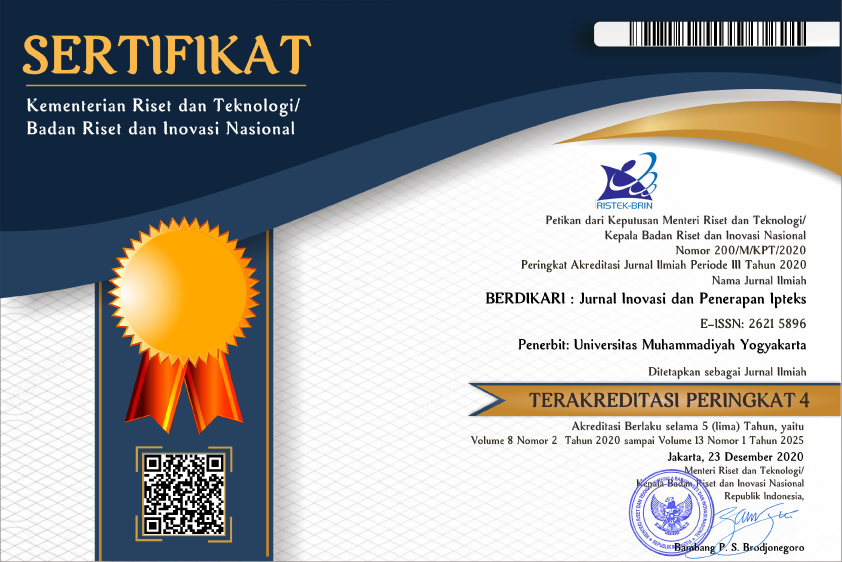Peningkatan Kapasitas Perempuan dalam Kesehatan Jiwa Keluarga Di masa Pandemi Covid-19
DOI:
https://doi.org/10.18196/berdikari.v9i2.10563Keywords:
women empowerment, mental health, covid-19Abstract
The Covid-19 pandemic that has occurred in the world has spread to Indonesia. Caused by the Covid-19 pandemic only on the health aspect but also on the social and economic aspects the impact not only has an impact on increasing problems. This problem is also experienced by the people of Ngapus Village. Ngapus village is a village prone to landslides. Most of the people in Ngapus Village work as farmers. The level of community education is low, namely elementary and junior high school graduates so that the income level of the community in Ngapus Village is still below the average. With the Covid-19 pandemic, it will certainly increase the poverty level in this village to a high level. Women like women in other villages also rose up and played a role in overcoming the socio-economic problems of the family. In helping to meet the needs of the family sometimes experience stress so it is necessary to make mental health efforts, especially at the family level. This program aims to help improve the mental health condition and preparedness of Ngapus Village residents. The method used to achieve this goal is through non-formal education for women, this is easier for the Dasawisma group because they are a vulnerable group. The implementation of community development is carried out through non-formal education, namely training carried out with lectures, discussions, practices and assistance to Mrs. Dasawisma, namely health about covid-19 and trauma healing due to the Covid-19 pandemic, in addition to training on making herbal drinks. The results of the implementation of this community development program are an increase in the knowledge and skills of mothers in the mental health of Dasawisma and an increase in preparedness in the field of mental, social and economic health during the Covid-19 pandemic.
References
Ali Anwar, Noer Hidayah, M. A. H. (2017). Pendidikan Non Formal Dalam Meningkatkan Keterampilan Anak Jalanan. Edudeena, 1(1), 31–42. https://doi.org/10.30762/ed.v1i1.445
DW, H. (2020). Pengangguran Akibat Covid-19 sulit direm , ini konsekuensinya. https://ekonomi.bisnis.com/read/20200505/12/1236810/pengangguran-akibat-covid-19-sulit-direm-ini-konsekuensinya
F, I. J. ;Tesorier. (2016). Community Development Alternatif Pengembangan Masyarakat di Era Globalisasi.
Giorgi, G., Lecca, L. I., Alessio, F., Finstad, G. L., Bondanini, G., Lulli, L. G., Arcangeli, G., & Mucci, N. (2020). COVID-19-Related Mental Health Effects in the Workplace: A Narrative Review. International Journal of Environmental Research and Public Health, 17(21). https://doi.org/10.3390/ijerph17217857
Indonesia, R. (2003). UU RI Nomor 20 Tahun 2003 Sistem Pendidikan Nasional.
Kesehatan, K., & Indonesia, R. (2021). Kemenkes raker dengan komite iii dpd ri bahas penanganan pandemi covid-19. 1–2.
Lauer, N. (2002). Community Development Strand Module : 1 . 1 Understanding Community Development Lecturer Support Material.
Listyorini. (2020). Memahami Tentang Pembatasan Sosial Berskala Besar (PSBB). https://investor.id/investory/memahami-tentang-pembatasan-sosial-berskala-besar-psbb
Organization, W. H. (2020). Coronavirus disease 2019 (COVID-19): situation report, 82. apps.who.int. https://apps.who.int/iris/bitstream/handle/10665/331780/nCoVsitrep11Apr2020-eng.pdf
Penanggulangannya, D. A. N. U. (2020). POTENSI LONJAKAN KASUS COVID-19. 2020(November).
PHEOC, K. R. (2020). Covid-19. https://covid19.kemkes.go.id/category/situasi-infeksi-emerging/info-corona-virus/#.X8YFgRYxU2x
Ravaldi, C., & Vannacci, A. (2020). The COVID-ASSESS dataset - COVID19 related anxiety and stress in prEgnancy, poSt-partum and breaStfeeding during lockdown in Italy. Data in Brief, 33, 106440. https://doi.org/10.1016/j.dib.2020.106440
Sakri, D. (2020). Menakar Dampak Pandemi COVID-19 terhadap Perekonomian Daerah. CSIS Commentaries DMRU-088-ID, 1–10.
Suryahadi, A., Al Izzati, R., & Suryadarma, D. (2020). The Impact of COVID-19 Outbreak on Poverty: An Estimation for Indonesia (Draft). SMERU Working Paper, April, 1–20. http://smeru.or.id/en/content/impact-covid-19-outbreak-poverty-estimation-indonesia
Wafiyah. (2015). PEMBERDAYAAN DASA WISMA SEBAGAI UPAYA PEMBERLANGSUNGAN K3 (KEBERSIHAN, KEINDAHAN, DAN KETERTIBAN) DI DUSUN GINTUNGAN, DESA DEYANGAN, KEC. MERTOYUDAN, KAB. MAGELANG. DIMAS, 15.
Z., A. M. B. ;Antoniputr. A. ;Annis. D. ;Fadi. (2020). Analisis Faktor dan Tipologi dalam Kebijakan Pembatasan Sosial Berskala Besar (PSBB) transisi sebagai upaua penanganan covid-19 di DKI Jakarta. https://www.researchgate.net/publication/345714127_ANALISIS_AKTOR_DAN_TIPOLOGI_DALAM_KEBIJAKAN_PEMBATASAN_SOSIAL_BERSKALA_BESAR_PSBB_TRANSISI_SEBAGAI_UPAYA_PENANGANAN_COVID-19_DI_DKI_JAKARTA
Downloads
Published
Issue
Section
License
Copyright
Authors retain copyright and grant BERDIKARI Jurnal Inovasi dan Penerapan IPTEK the right of first publication with the work simultaneously licensed under an Attribution 4.0 International (CC BY 4.0) that allows others to remix, adapt and build upon the work with an acknowledgment of the work's authorship and of the initial publication in BERDIKARI Jurnal Inovasi dan Penerapan IPTEK.
Authors are permitted to copy and redistribute the journal's published version of the work (e.g., post it to an institutional repository or publish it in a book), with an acknowledgment of its initial publication in BERDIKARI Jurnal Inovasi dan Penerapan IPTEK
License
Articles published in the BERDIKARI Jurnal Inovasi dan Penerapan IPTEK) are licensed under an Attribution 4.0 International (CC BY 4.0) license. You are free to:
- Share — copy and redistribute the material in any medium or format.
- Adapt — remix, transform, and build upon the material for any purpose, even commercially.
This license is acceptable for Free Cultural Works. The licensor cannot revoke these freedoms as long as you follow the license terms. Under the following terms:
- Attribution — You must give appropriate credit, provide a link to the license, and indicate if changes were made. You may do so in any reasonable manner, but not in any way that suggests the licensor endorses you or your use.
- No additional restrictions — You may not apply legal terms or technological measures that legally restrict others from doing anything the license permits.




